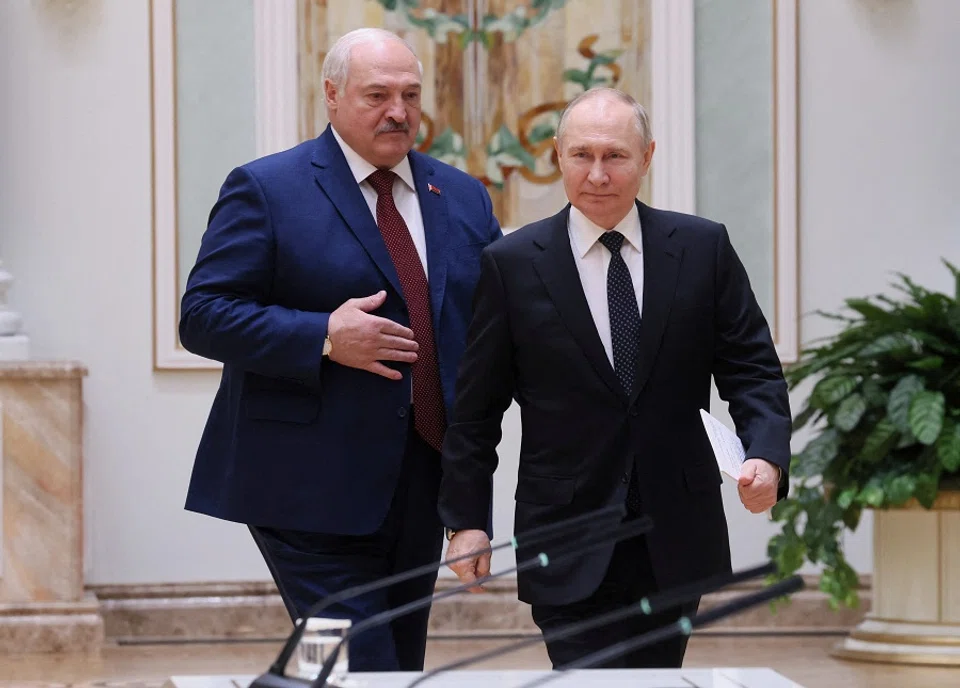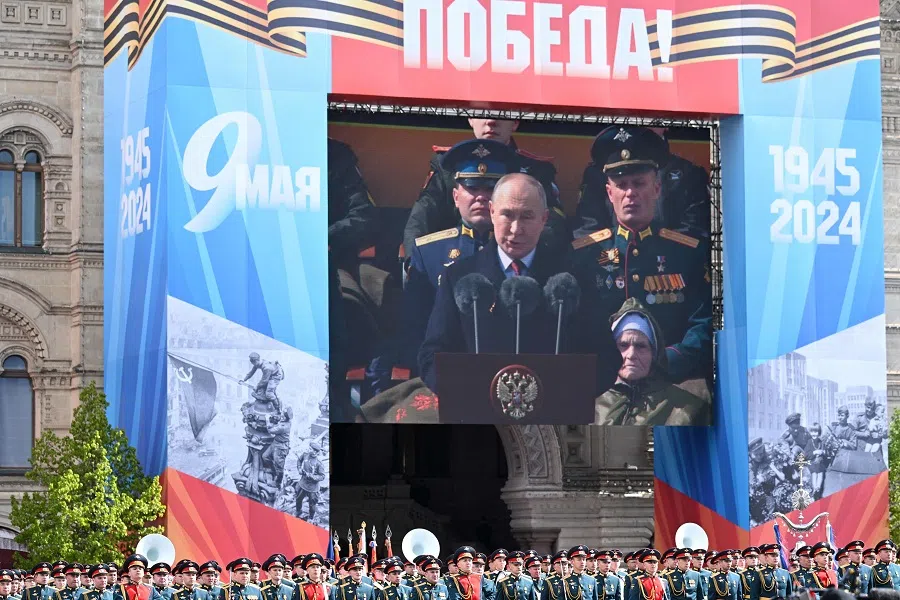Belarus: China’s insurance policy against Russia
Neither Chinese President Xi Jinping nor Belarusian President Alexander Lukashenko is ready to sacrifice everything for Putin, says academic Dmitry Shlapentokh.

Recently, an official parliamentary delegation from Belarus visited China in May to strengthen the relationship between the two countries. The event was overlooked by Western mass media as a minor episode of no importance.
One might add here that the relationship between Minsk and Beijing is usually seen either as a minor aspect of China’s foreign policy or interpreted in the context of the prevailing paradigm, in which the alliance of “tyrants” Xi Jinping and Vladimir Putin patronises an assortment of minor “tyrants”.
Meeting of the ‘tyrants’?
President Alexander Lukashenko of Belarus, nicknamed “Little Father”, is viewed as one of these minor “tyrants”. Lukashenko appears to be a brutal tyrant who is completely subservient to Putin, a geopolitical bedfellow of Xi. However, this vision is over-simplistic and wrong.
Neither is Xi ready to sacrifice everything for Putin nor is Lukashenko totally submissive to Putin. Each of them is playing his own game. Minsk has the same frictions with Moscow that Beijing does.
Consequently, Beijing is trying to establish a separate foothold in Belarus in the same way that it has done in Western Europe. In fact, Beijing implicitly exploits the frictions between Belarus and Russia.
His [Lukashenko’s] vision of union with Russia implied the resurrection of old Soviet arrangements where political loyalty would be rewarded by generous economic largesse.
The birth of Belarus
Like other post-Soviet states, Belarus, a Slavic and basically Russified republic, emerged after the collapse of the USSR. Still, it is distinctly different from the other post-Soviet states.
Firstly, Lukashenko, who emerged quickly as the republic’s leader, has preserved the socioeconomic skeleton of the former USSR. There was no wholesale “privatisation” which would have led to speedy deindustrialisation as was the case of many post-Soviet states. Secondly, he preserved the social safety net from the Soviet era, in particular those segments related to education and healthcare.
Thirdly, Russian was kept as the state language. Lukashenko regarded the collapse of the USSR as a great catastrophe and believed that numerous ethnicities of the USSR would be unified once again. Lukashenko also embraced Slaviophilism which implied the unity of Slavs. His vision of union with Russia implied the resurrection of old Soviet arrangements where political loyalty would be rewarded by generous economic largesse.
Finally, Lukashenko had a personal interest in union with Russia. He rightfully assumed that Yeltsin and his reforms were highly unpopular and that a considerable segment of the Russian population loathed Yeltsin who, of course, was praised in the West. Consequently, Lukashenko assumed that he could well replace Yeltsin. All of these made him respond positively to Moscow’s overtures and in 1999, Russia and Belarus signed a Union State Treaty. By that time Yeltsin was about to depart and Lukashenko anticipated his arrival to the Kremlin in the near future. Lukashenko’s plans did not materialise.
Lukashenko disappointments and first contacts with China
While Lukashenko dreamed of entering the Kremlin with a populace outraged by Russia’s neo-capitalist transformation, he was disappointed. The oligarchs, Russia’s super-rich, were hardly pleased with Lukashenko and his plan to return to neo-Soviet arrangements. Instead, they installed Putin by an elaborate plot.
Putin had no desire to engage in massive nationalisation and to provide Belarus with cheap natural resources, mostly gas. He emerged as the leader of a mostly traditional European capitalist state in which the elites looked at weaker states as a source of enrichment. Soviet-era arrangements were gone even though Putin employed some of Soviet symbolism to dupe the populace, at least in the beginning of his tenure.
Lukashenko had been able to survive despite increasing Russia’s pressure and isolation from the West. Still, he needed help and was engaged in the search for a few allies. China emerged as one of them.

Lukashenko soon realised that Putin’s Russia was not a Soviet replica and Minsk could hardly expect to be of much help. Minsk needed cheap gas for its industry. Still Moscow demanded a high price and was ready for a complete absorption of Belarus and transform it into a Russian province.
Lukashenko had been able to survive despite increasing Russia’s pressure and isolation from the West. Still, he needed help and was engaged in the search for a few allies. China emerged as one of them.
China and Belarus
China’s approach to Belarus was similar in concept to its approach to the West. It tried to avoid dealing with big organisations, such as the EU, where several powers could create a united front. Instead, they preferred to deal with individual countries that are more vulnerable and ready for cooperation.
The relationship, while having some economic outcomes, was mostly geopolitical in nature and planned for generations. Following in many ways the practices of imperial China, Beijing planned to create a web of dependent friendly vassal states.
... the development of a good relationship with Belarus was seen by frequent visits of Chinese delegations bearing lavish gifts, investments and other benefits, which was an important insurance against potential problems with Moscow.
China’s early approach to Belarus was conditioned by its vision of Russia. While its relationship with Russia improved visibly after the collapse of the USSR, Beijing looked at Moscow with apprehension.
The Russian elite had discarded Marxism and clearly demonstrated its desire to be a part of the West and even NATO. The Russian mass media was full of discussions about a possible war between Russia and China or elaborated on the dangerous demographic expansion of millions of Chinese.
In these situations, the development of a good relationship with Belarus was seen by frequent visits of Chinese delegations bearing lavish gifts, investments and other benefits, which was an important insurance against potential problems with Moscow.
In 2014, Russia’s relationship with the West worsened considerably due to the annexation of Crimea and after the start of the war with Ukraine, the bridges with the West were burned completely. China seemed to be the only alternative.
Beijing immediately took advantage of this and pushed Russia to build the Power of Siberia gas line at its own expense and to sell gas to China for a much cheaper price than Moscow had planned. When Moscow was cut completely from European markets after the beginning of the Ukrainian war in 2022, it entertained Beijing with a plan for a new pipeline. Still, projects do not lead to desirable results.

The point here is that Beijing is asking for a lower price for its gas supply. According to a Chinese proposal, the gas for Chinese consumers should not be higher than for Russians.
While taking the notion of China “friendship” with Moscow with a grain of salt, one should remember that Moscow approaches Minsk in the same way. Despite its limited market for its gas, Russia did not provide much discount for Minsk. Lukashenko reciprocated in kind. Regardless of his assurance for Russia support, he did not engage in war with Ukraine despite Putin’s prodding.
Sensing the tensions between Russia and Belarus, Beijing has been following its old tactics of preferring not to deal with groups of allies. It has developed a relationship with Minsk which parallels the relationship with Russia. It even upgraded its relationship with Minsk, and in 2015, Xi Jinping himself visited the country.
Lukashenko reciprocated and the present-day Belarus parliamentary delegation that visited China recently followed suit. Their interlocutors in Beijing reassured them that Belarus would continue to receive benefits from China.
Still, a common ideological background and socioeconomic structure provide a certain basis for establishing a friendly relationship.
Soviet past a useful link
For instance, the Belarus parliamentary delegation was assured that China would help Belarus join international organisations such as BRICS and SCO. This is also a sign of special trust due to ideological affinity.
Beijing is not usually much concerned with the ideological make-up of its partners. Beijing, for example, completely ignores the fierce anti-communism of the Putin regime. One should remember that this pragmatism is not something new. Mao was quite pragmatic in his approach, and as research shows, deals with arch-conservative Nixon were made plainly because red China and the US shared a common apprehension about the USSR.
Still, a common ideological background and socioeconomic structure provide a certain basis for establishing a friendly relationship. Lukashenko’s Belarus preserves most of the socioeconomic structures of the USSR and never discarded its Soviet past. This makes its relationship with China smoother.
The China-Belarus relationship can be compared to the relationship between imperial China and other countries which share the tenets of Confucian culture. Consequently, as a sign of special trust, the special excursion to The Museum of the Communist Party of China was arranged during the delegation’s visit.
Thus, in summary, as in the case with the West, China prefers to deal with individual countries and subtly or not so subtly plays on their friction/conflicts. It tries not to ignore small countries whether it is Hungary, Serbia, or in this case, Belarus.
Here, the web of potential friends or semi-friends, so to speak, is slowly built; this “Great Wall” political project could take generations or possibly centuries to accomplish. At the crux of it, China’s goal is constructing a Chino-centric universe.





